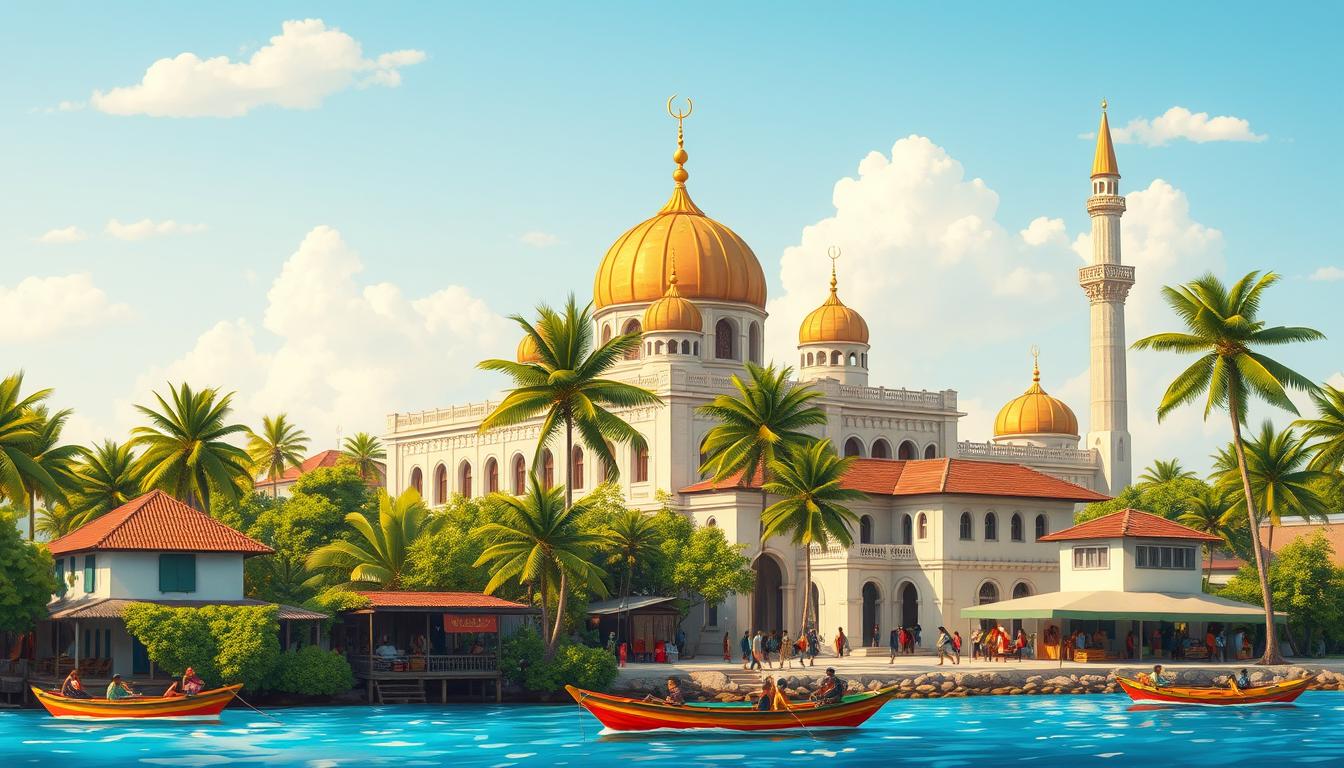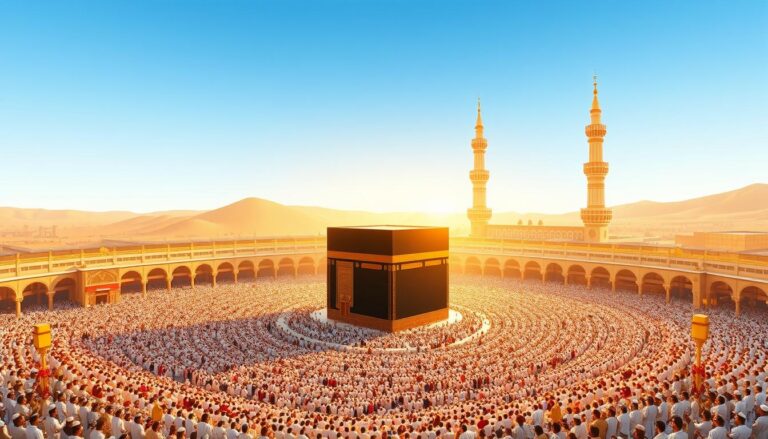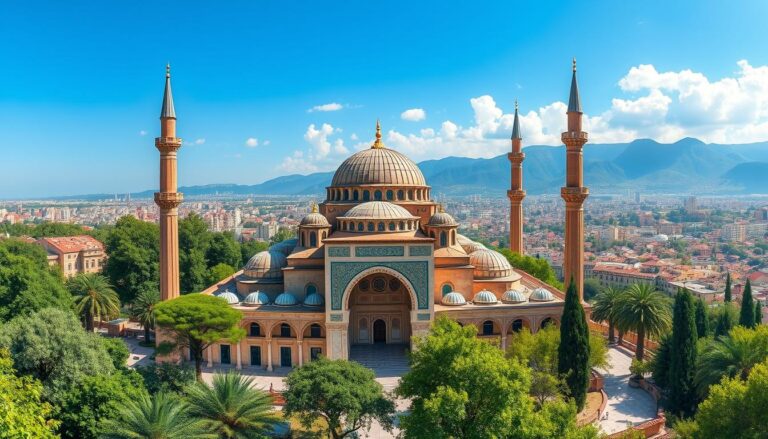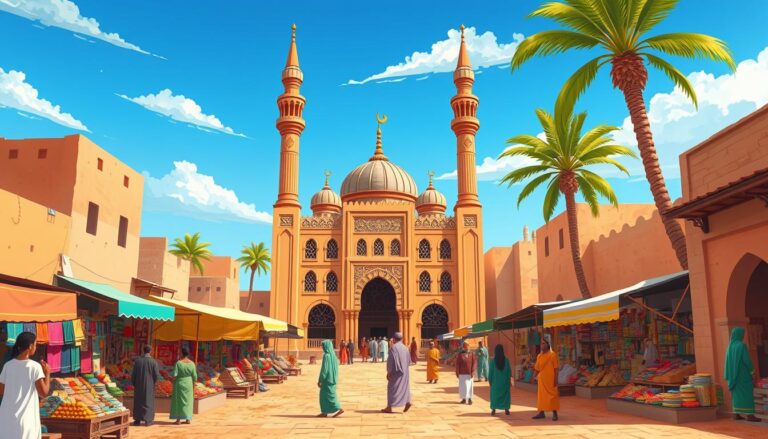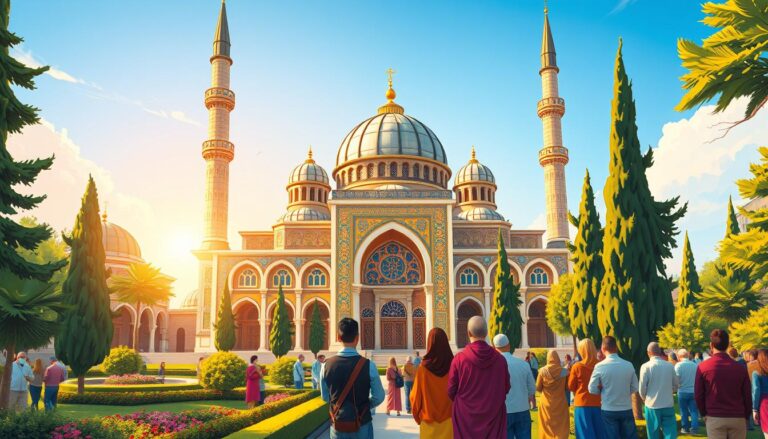Islam in Zanzibar (part of Tanzania)
Zanzibar, a semi-autonomous archipelago off Tanzania’s coast, shows Islam’s lasting impact on the Swahili Coast. About 99% of its people follow Islam, making it Tanzania’s Islamic heart. The story of Islam in Zanzibar is deeply tied to the island’s culture.
The connection to Islam in Zanzibar began in the 10th century. Arab traders and settlers from the Arabian Peninsula, Persia, and India brought Islam. Zanzibar’s role in the Spice Trade and slave trade made it a key Islamic center, shaping the Swahili culture.
The mosques and architecture in Stone Town show Islam’s mark on Zanzibar. The island’s Sufi and Ibadhi traditions also reflect this. Zanzibar, as part of Tanzania, keeps its Islamic identity strong. Most people follow Sunni Islam, with a smaller Shia and other denominations minority.
Origins of Islam in Zanzibar
The ancient mosques of Zanzibar, like the Kizimkazi Mosque and the Ras Mkumbuu Mosque, remind us of Islam’s long history here. Archaeologists found that Islam has been in Zanzibar for over a thousand years. The Kizimkazi Mosque has Kufic inscriptions from A.D. 1106, and the Ras Mkumbuu Mosque dates back to the 10th century.
Archaeological Findings
These mosques and their Kufic inscriptions give us a glimpse into Islam’s early days in East Africa. Scholars have different ideas on how Islam first came to Zanzibar. Some think it was brought by Arab traders, others by Zaidites from Ethiopia and Somalia, and a third group believes it came from Persia.
Even though we don’t know the exact start, the evidence shows Zanzibar was key in spreading Islam and culture. It played a big role in creating the unique Swahili identity of the region.
Islam’s Role in Shaping Swahili Culture
Islam has been key in forming the Swahili culture along the East African coast. Being Swahili means knowing Islam’s teachings and participating in it. This has brought people together through shared values and a sense of community.
The Swahili culture, known for its trade, diversity, and city life, has been shaped by Islam. Islam has influenced Swahili architecture and language, adding Arabic words. The Swahili identity combines African and Islamic traditions, with roots in Persia.
“Islam has become an integral part of Swahili culture, shaping everything from language to architecture, and connecting the Swahili people to a global Islamic community.”
In Zanzibar, over 98% of people are Muslim, showing Islam’s deep role in Swahili life. Mosques, schools, and Sufi orders help keep Swahili culture and religion alive.
Islam’s impact on Swahili culture is seen in architecture and language. This mix of African and Islamic elements has made Swahili culture rich and lively. It continues to influence the East African coast.
Islam as a Unifying Force
Islam has been a strong bond in Zanzibar, bringing people together through shared beliefs and values. Swahili townspeople saw more in common with Muslims worldwide than with those in Africa. This connection was rooted in their shared faith.
The idea of Swahili identity and cosmopolitanism emphasized ties to Persia, not Africa. Zanzibar’s role as a key center for the Omani sultanate in the 1800s made it a beacon of Islamic unification.
Swahili Identity and Cosmopolitanism
The Swahili identity and cosmopolitanism in Zanzibar were shaped by its strategic location. This spot on major trade routes helped spread Islam, especially in areas similar to the Arabian Peninsula.
Countries near old trade routes were more likely to adopt Islam. The similarity in land suitability to the Arabian Peninsula played a role. Geographic inequality also influenced this spread, driven by productive endowments and specialization.
“Long-distance trade opportunities promote the adoption of Islam, especially across unequally endowed regions.”
Islam’s impact on Swahili cosmopolitanism and identity is immense. As Islam grew through conquests, trade, and migrations, it united Zanzibar. This made the region’s culture and faith unique.
Islam and Civilization
Islam became a key part of Zanzibar’s culture, seen as a symbol of civilization. In Swahili, this is known as muungwana and mstaarabu. The prestige of Islamic connections helped make Islam important in Swahili life.
The impact of Islam is seen in Zanzibar’s architecture, trade, and social structures. The start of stone buildings in Stone Town in the 1820s shows Islam’s growing role. Also, the trade deals with Western powers from 1833 show how Islamic and international trade mixed.
“Islam presents an ever-changing and non-static phenomenon in Zanzibar, with the form it takes shaped by historical debate and power struggles in the region.”
Today, Islam is the main religion in Zanzibar, with 99% of people being Muslim. The culture of Zanzibari children is deeply influenced by Islamic traditions. This strong link between Islam and Swahili culture has made the religion a lasting part of the region.
The bond between Islam and Swahili culture is complex but vital. It shows how Islam has shaped Zanzibar’s culture and growth. Knowing this relationship helps us understand Zanzibar’s history and the lasting impact of Islamic faith.
Islam and Cultural Identity
The Swahili people along the East African coast have long traced their ancestral roots outside of Africa. Many groups emphasize their Shirazi origin from Persia. Zanzibar became a central location for the Omani sultanate in the 19th century. This has solidified the Arab influence and heritage within the local Islamic and cultural identity.
Shirazi and Arab Heritage
The Shirazi culture, deeply rooted in the Swahili tradition, has shaped Zanzibar’s religious and social fabric. This Persian-influenced heritage has blended with the strong Arab presence. This has created a unique cultural tapestry that reflects the diversity and complexity of the region.
The Arab heritage in Zanzibar is evident in architectural styles, culinary traditions, and language. The Omani sultanate’s influence has left a lasting mark on the island’s history. This has formed a cosmopolitan society that blends African, Persian, and Arab elements seamlessly.
“The Shirazi people have long been regarded as the original inhabitants of the Swahili coast, with their ancestry tracing back to Persia. This cultural heritage, combined with the Arab influence, has created a unique and vibrant identity that is deeply woven into the fabric of Zanzibar’s Islamic traditions.”
The interplay between Shirazi culture and Arab heritage has enriched Zanzibar. This blending of influences has shaped the region’s religious, social, and artistic expressions. It has created a dynamic and multifaceted Islamic identity that continues to fascinate scholars and visitors.
Post-Revolution Islam
The Zanzibar Revolution in 1964 changed Islam in the area a lot. Groups like Ansâr Sunna wanted to make Islam pure again. They criticized local customs and traditions that they thought were wrong.
These groups didn’t like ziara (visiting shrines), tawasud (asking saints for help), khitma (reading the Quran for the dead), and Maulid parties. They saw these as not true to Islam. They also worried about Western culture’s influence, especially in tourism.
- Ansâr Sunna aimed to bring back true Islam and criticized local customs.
- They saw ziara, tawasud, khitma, and Maulid as not following Islam’s teachings.
- They were concerned about Western culture’s impact, especially in tourism.
The time after the revolution changed Zanzibar’s religious scene a lot. The Islam in post-revolution Zanzibar focused more on changes in Muslim practices. This was because of Salafi groups trying to make Islam pure and alive again.
“The revolution ended over 250 years of Arab dominance in Zanzibar, and the subsequent nationalist movements focused on Islam as a response to Western hegemony in the 20th century.”
Islam in Zanzibar (part of Tanzania)
Zanzibar is a Muslim-majority archipelago off Tanzania’s coast. Over 99% of its people are Muslim. In contrast, Tanzania’s mainland has more diversity, with Christians at 63% and Muslims at 34.1% as of 2020.
The Islam in Zanzibar has deeply influenced its culture and identity. Sunni Islam is the main branch, with Shiites also present. The Muslim communities here have a rich heritage, influenced by Shirazi and Arab traditions.
Despite being mostly Muslim, Zanzibar faces challenges like gender inequality. Women face restrictions on inheritance and property rights. One law even sentences Muslim women 21 or younger to jail for being pregnant out of wedlock.
“In Zanzibar and many parts of the mainland, women generally face discriminatory restrictions on inheritance and property rights due to the Marriage Act not being applicable in Zanzibar.”
The Muslim population in Zanzibar greatly influences the region’s culture and society. Knowing about Islam in Tanzania and its impact on Zanzibar helps us understand the country’s religious and social landscape.
Muslim Denominations
Zanzibar, a part of Tanzania, has a mostly Muslim population. About 99% of people here call themselves Muslim. Most, around 90%, follow Sunni Islam, mainly the Shafi’i and Maliki schools.
The Sunni Muslims have been present in Zanzibar since the 19th century. Their influence is deep and lasting.
Zanzibar is also home to a strong Sufi presence. The Qadiriyya and Shadhiliyya Sufi brotherhoods are well-known here. They grew in influence as more people moved along the Swahili coast.
These Sufi movements have greatly shaped Zanzibar’s culture and faith. They play a big role in the island’s identity.
The variety of Muslim denominations in Zanzibar shows its rich history. It was a key center for culture, trade, and faith along the Swahili coast. This diversity has helped create a unique Swahili identity and a cosmopolitan vibe.
Salafi and Reformist Movements
Groups like Ansâr Sunna, influenced by Wahabi teachings, have been in Zanzibar since the late 20th century. They aim to revive Islam and challenge local customs. They focus on practices like ziara, tawasud, khitma, and Maulid celebrations. They also oppose traditional healing and Western influences, especially with Zanzibar’s growing tourism.
The Salafi movements, including Ansâr Sunna, openly criticize local customs they see as deviating from Islam. They aim to make Islamic practices more conservative and literal. This contrasts with the culturally-influenced Islam practiced in the region.
These Salafi movements in Zanzibar face opposition from traditional Muslim groups. They see the Salafis as a threat to the Swahili-Islamic identity shaped over centuries. The debate between Salafis and defenders of local customs shapes Zanzibar’s religious scene.
“The Salafi groups in Zanzibar seek to eliminate local customs and traditions that they believe have corrupted the true teachings of Islam. This has created tension with the more syncretic Islamic practices that have been part of Swahili culture for generations.”
Shia Muslims in Zanzibar
Zanzibar, a part of Tanzania, has a diverse Muslim community. Shia Muslims are a part of this community. They include Shia Ithna’asharis, Shia Bohras, and Shia Ismailis.
Many Shia Muslims in Zanzibar come from Asia, especially India. Their roots go back to India.
Shia Bohras keep their Indian heritage alive, especially in marriage. The Twelver Shia community in Zanzibar spreads the teachings of Ahlulbayt. They are led by Sheikh Abdulrazak Amiri, a Shia cleric from Arusha.
The Shia community in Zanzibar has a long history. It goes back to the Zanj Rebellion in the 9th century. The island’s role in the Indian Ocean trade routes has made its Muslim community diverse.
Today, Shia Muslims in Zanzibar keep their faith and culture alive. They add to the island’s rich religious scene. Shia Muslims play a big role in Zanzibar’s history and identity.
“The Shia presence in Zanzibar has a long and rich history, dating back to the Zanj Rebellion led by Shia scholar Ali ibn Muhammed in the 9th century.”
Notable Muslim Institutions
Zanzibar, a part of Tanzania, has many important Muslim institutions. They help keep Islamic traditions alive. The Wakf and Trust Commission and the Kadhi Courts are two key ones.
The Wakf and Trust Commission
The Wakf and Trust Commission manages religious endowments and charitable trusts in Zanzibar. It makes sure funds are used for good causes. This includes helping mosques, education, and those in need.
This commission is vital for the Muslim community’s religious and social well-being in Zanzibar.
The Kadhi Courts
The Kadhi Courts handle legal matters for Muslims in Zanzibar. They deal with marriage, divorce, inheritance, and more. These courts help Muslims solve legal issues based on their faith.
These institutions keep Zanzibar’s Islamic identity strong. They ensure the Muslim community’s practices and traditions are preserved.
Influential Muslim Clerics
Zanzibar has seen many influential Muslim clerics and scholars. They have greatly impacted the region’s religious and cultural scenes. Sh. Abdullah Saleh Farsy, Sh. Nassor Bachoo, and Sh. Amir Tajir are among them.
Sh. Abdullah Saleh Farsy was a famous Islamic scholar. He was the first to translate the Quran into Swahili. His work in spreading Islamic teachings has made him a key figure in Zanzibar.
Sh. Nassor Bachoo was a well-known cleric in East Africa. He was a spiritual leader for the Ansâr Sunna reform movement. His teachings had a big impact on the region’s religious scene, especially for those wanting a purer Islam.
“Sh. Nassor Bachoo was a prominent figure who left an indelible mark on the Islamic community in Zanzibar and the surrounding areas.”
The late Sh. Amir Tajir was the Chief Qadi in Zanzibar. He oversaw the judicial system and made sure Islamic law was followed. His role as a leading scholar and jurist shows the big influence of Muslim scholars in Zanzibar.
These are just a few examples of influential Muslim scholars in Zanzibar. Their teachings and leadership have shaped the Swahili people’s religious and cultural identity.
Conclusion
Zanzibar’s Islamic heritage shows the deep roots of Islam in the area. Ancient mosques and Kufic inscriptions highlight Islam’s role. The Swahili culture and architecture also reflect this influence.
The island’s Muslim-majority population and diverse denominations shape its present. This makes Zanzibar a unique example of Islam in East Africa. It shows the faith’s vibrant and varied nature.
The article summarizes Islam in Zanzibar, focusing on its key points. Zanzibar’s strategic location and trade history have shaped its Islamic identity. Sunni and Sufi traditions, Shia groups, and religious institutions have all influenced the island.
Tanzania’s religious diversity is highlighted by Zanzibar’s experience. The island’s cultural heritage and efforts to preserve its Islamic legacy are significant. They show Islam’s lasting importance in the region.
Source Links
- Islam in Zanzibar
- Islam in Zanzibar by Darby FitzSimmons
- Islam in Tanzania
- World Directory of Minorities and Indigenous Peoples – United Republic of Tanzania : Shirazi and Arabs of Zanzibar | Refworld
- Ramadan in Zanzibar: The Intersection of Islam and Culture
- African Islam in Tanzania
- Islam and Imperialism in East Africa
- Trade and Geography in the Spread of Islam
- ISLAM AND POLITICS IN TANZANIA
- Zanzibar History, Festivals and Religion | Tanzania Odyssey
- Zanzibar
- Religion in Tanzania: A Statistical and Cultural Overview
- Microsoft Word – IR 357 Zanzibar Class.docx
- Role Of Islam On Politics In Zanzibar
- Zanzibar Revolution
- Brief History | Tanzania Embassy in Berlin, Germany
- Brittany Gregerson on Islam and Gender Relations in Zanzibar
- Tanzania Religion: Christianity, Islam, and Witchcraft
- Religion in Tanzania
- Tanzania – United States Department of State
- No title found
- Tanzania and the Political Containment of Terror
- Muslim political dissent in coastal East Africa: complexities, ambiguities, entanglements
- African Odyssey: How Shiite Islam reached Tanzania, and Ashoura Processions became an Annual Tradition
- Zanzibar: A Journey through A Tropical Paradise
- Ibadi Muslim schools in post-revolutionary Zanzibar | Africa | Cambridge Core
- Tanzania – United States Department of State
- Islam in Kenya and Tanzania
- Nyerere Against Islam in Zanzibar and Tanganyika — Mwalimu Julius K. Nyerere
- http://www.state.gov/g/drl/rls/irf/2003/23757.htm
- Tanzania – United States Department of State

